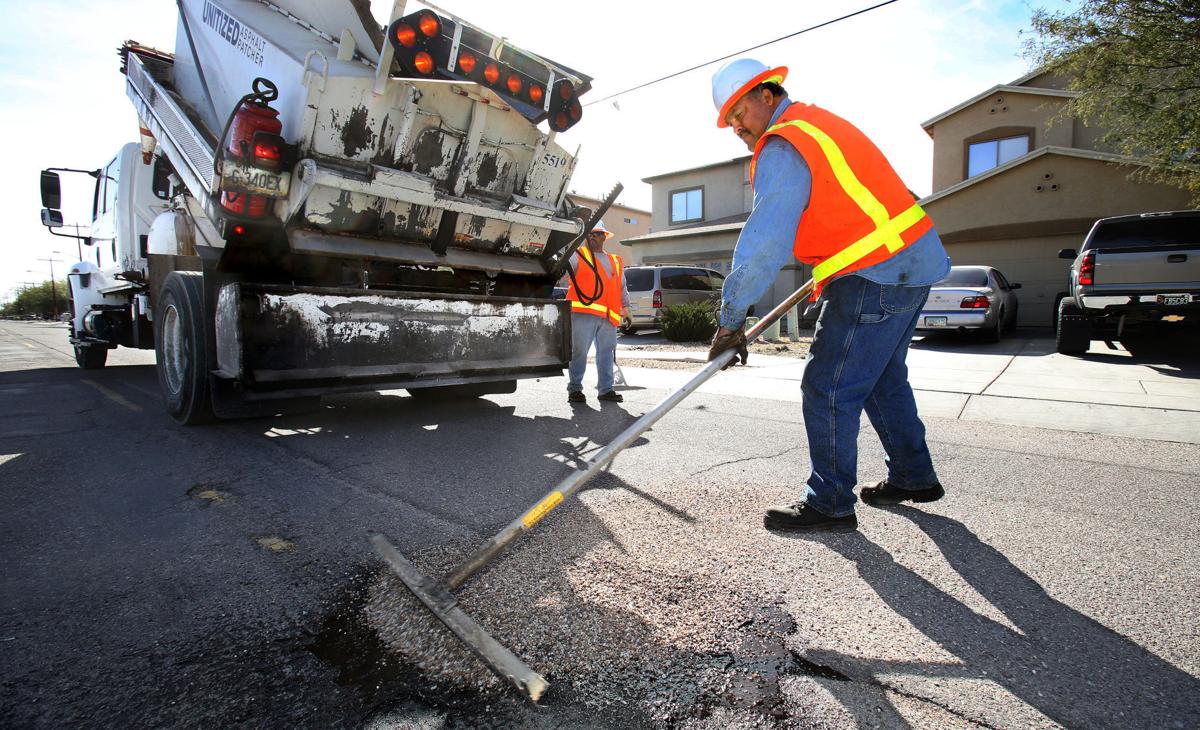A county sales tax to fund road repair now has a new advocate: Pima County Supervisor Steve Christy.
As many county officials have argued previously, Christy told the Rotary Club of Green Valley on Tuesday that the chances of the Legislature green-lighting a number of ways to increase funding for area road repair are slim to none. Those include allowing Pima County to levy its own gas tax, altering transportation-funding distribution formulas and, among other things, raising the state gas tax, which hasn’t been done since the early 1990s.
“Someone close to the governor told me that during a recent function, someone asked Governor Ducey if he would support raising the state’s gas tax,” Christy recounted in his speech. “His response? He said, ‘Not only no, but hell no./’”
That leaves Pima County with two options for raising additional revenues for roads: a property tax, which was enacted over the summer without the support of Christy and fellow Republican Supervisor Ally Miller; and a sales tax, which requires a unanimous vote of the board.
The 25-cent Road Property Tax, for which bills for the first half have already gone out, is estimated to generate roughly $19.5 million annually. That money will be split between unincorporated Pima County and other jurisdictions.
Getting all county roads to fair condition, however, is estimated to take well over $1 billion.
“Clearly, a drop in the bucket, all paid for on the backs of county property owners, who already feel overtaxed,” is how Christy derisively described the property tax to the Rotarians.
A half-cent sales tax, on the other hand, would bring in an estimated $70 million in fiscal year 2019 and nearly $900 million over 10 years, according to county estimates. For taxpayers, approval would spell an extra $91 in sales-tax payments every year.
While it would be the county levying the tax, Christy thinks the Regional Transportation Authority should oversee the revenues. That’s because he says the RTA has earned the trust of voters in its first 11 or so years of existence, as well as the seal of approval from a recent state audit that found projects were largely completed on time and on budget.
As to the already enacted property tax, Christy hopes to rapidly repeal it and bring a sales-tax proposal, which he suggests should have a 10-year sunset provision, to a vote as soon as November.
County Administrator Chuck Huckelberry said such an arrangement with the RTA is possible and worth exploring, but that an immediate repeal of the property road tax is more complicated.
“You can’t really annul a property tax once it’s levied,” he said, but added later that the following year’s rate could be reduced to essentially offset the taxes paid this year.
Huckelberry has also previously suggested that a portion of sales-tax revenues could be used to reduce property taxes in Pima County, though Christy told the Road Runner that “100 percent revenues” are needed for road repair.
Christy’s proposal, which he dubbed the “Just Fix the Roads Plan,” will face skepticism, including from Supervisors Richard Elías and Miller.
Elías is particularly concerned that using sales taxes, which are regressive, for road repairs “ultimately transfers the burden onto people who really can’t afford it at this time.”
He also says that voting on a sales tax, which Pima County has never levied, within the next couple months is a very tight timetable, and doesn’t give “a lot of time to fully vet” the proposal.
Miller shares some of those concerns, but her criticism is more fundamental. The county already takes in enough money to adequately address road conditions, but doesn’t do so because spending is poorly prioritized, Miller says.
She pointed to county plans to build more soccer fields and a new wastewater facility as evidence. “It isn’t a revenue problem, it is a spending problem,” Miller told the Road Runner.
With no votes to spare, Christy said he acknowledges it will be an uphill battle to get a sales tax approved for the first time. But he also said he thinks of his plan as the start of a conversation, not a take-it-or-leave it pitch. He has asked that a discussion of the plan be put on Tuesday’s Board of Supervisors agenda.
“Being a former car salesman, one of the core things you do when you’re making a deal is you find the objections ... and once you find the objections, you work to overcome them,” he said.
Though the decision will ultimately be the supervisors’ alone, Green Valley Rotarian Michael Pease, the club’s secretary, said he and many others were compelled by Christy’s pitch. He liked that sales taxes would also be paid by tourists and others passing through the county and using its roads, whereas the current property tax is paid only by residents.
“We all use the roads, and so the tax falling on everybody, as long as it’s just for that purpose, makes sense,” he said.
DOWN THE ROAD
Microsealing work on Linda Vista Boulevard from Thornydale Road to Hartman Lane begins Monday. Through Wednesday, the contractor will do preliminary work, including crack sealing, with the microseal work to take place Thursday and Friday. Lane and speed restrictions will be in place. Sheriff’s deputies and flaggers will be on scene to handle traffic.





